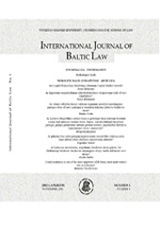Are European in-house counsel covered by the attorney-client privilege?
Are European in-house counsel covered by the attorney-client privilege?
Author(s): Darius DavainisSubject(s): Law, Constitution, Jurisprudence
Published by: Florida Coastal School of Law and Vytautas Magnus University School of Law
Keywords: European; in-house; counsel; covered; attorney; client; privilege
Summary/Abstract: ARE IN-HOUSE COUNSEL COVERED BY THE ATTORNEY-CLIENT PRIVILEGE? Author compares and analyses the position and the limits of application of the attorney-client priviledge to the in-house counsel in various legal systems. Specifically, the investigation covers the law of the United States, the law of some member states of the European Union (including Lithuania) and the law of the European Union itself. The investigation shows that the institution of the attorney-client priviledge is applied to the in-house counsels differently in various jurisdictions and that there are no objective universal criteria to define its application. One group of countries – the US, England and other common law countries, also some countries of Continental Europe, generally recognize this institution and apply it to all categories of lawyers, including in-house counsels, although they impose on them various rules that define and limit the application of this institution. It probably rests on the general principle, that each person should be able to effectively consult a lawyer of his/her choice and be able to keep the communications confidential and thus prevent the early damage of his/her rights. Moreover, the recognition of the privilege for legal counsel independently of their status is enabled by mandatory membership in the Bar of all practicing lawyers and thus their commitment to the Bar’s ethical rules and subjection to disciplinary proceedings. Other countries of the European Union recognize the institution of the attorney-client priviledge only for those in-house lawyers who are members of the Bar. Some countries, as France, Austria, Sweden or Germany, do not recognize this institution at all or are specific in this respect. Author states that, generally, the legal situation in this area in many continental European countries is indefinite. There is little or no case law, and the authorities have respected the privilege for in-house counsel even in the instances where it is not granted by legislation. The same applies to Lithuania, although here some notes may be made in respect to the legislation. The regulation of Lithuanian civil procedure provides for the almost limitless application of the institution of the attorney-client priviledge. The regulation of the criminal procedure does not protect this priviledge in respect to the in-house counsels, representing the legal entity. The rules of the administrative procedure reflect the approach where this institution is apllied only for the testimony, but not documented evidence.
Journal: International Journal of Baltic Law
- Issue Year: 2004
- Issue No: 4
- Page Range: 11-24
- Page Count: 14
- Language: English

